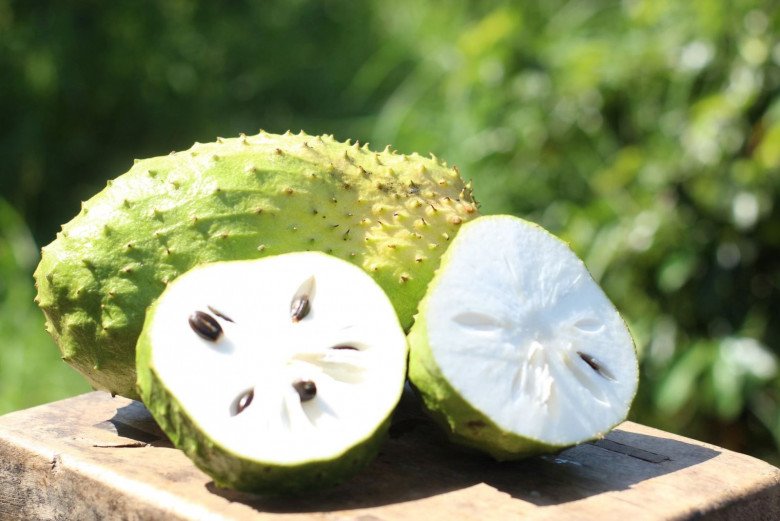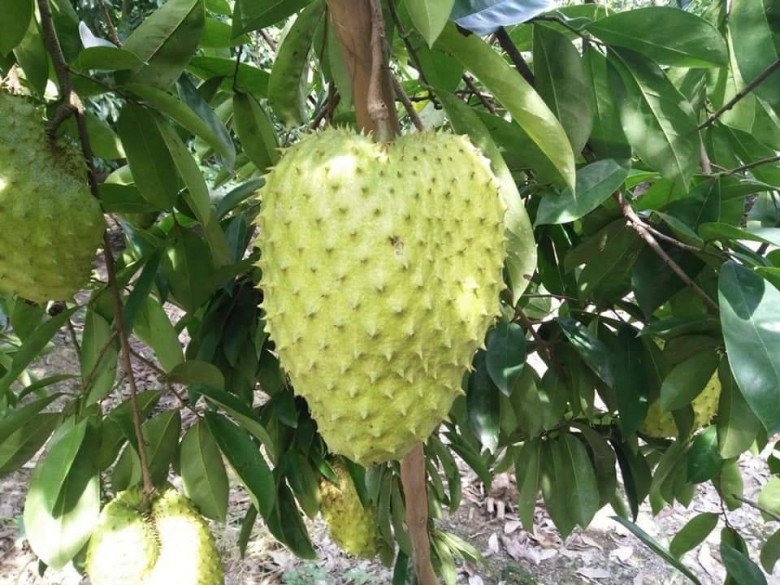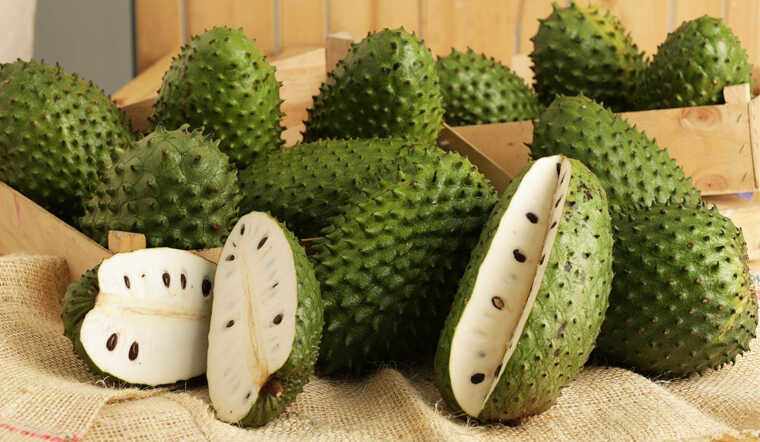Nutritional composition of custard apple
Soursop is a very popular and loved fruit. Custard apple has sweet and sour duck, white flesh, fiber, black seeds, indigestible core.
Soursop can be used in many different ways, in addition to eating it directly, it can be made into smoothies, tea, juice, ice cream, confectionery…
Soursop is rich in fiber, vitamins and minerals, so it has the ability to support immunity, reduce inflammation and promote eye and heart health. However, certain parts of custard apple contain toxins that can damage the nervous system if consumed in large amounts.
Nutritional ingredients in 100 g of custard-apple include:
– Energy: 276 KJ
– Sugar: 13.54 g
– Fiber: 3.3 g
– Fat: 0.3 g
– Protein: 1g
– Thiamine (vitamin B1): 0.07 mg
– Riboflavine (vitamin B2): 0.05 mg
– Niacin (vitamin B3): 0.9 mg
– Pantothenic acid (Vitamin B5): 0.253 mg
– Vitamin B6: 0.059 mg
Folate (vitamin B9): 14 micrograms
– Choline: 7.6 mg
– Vitamin C: 20.6 mg
– Calcium: 14 mg
– Iron: 0.6 mg
– Magnesium: 21 mg
What is the effect of custard apple?
1. Contains a lot of antioxidants
Custard apple contains many antioxidants, which help fight free radicals in the body. High levels of free radicals can cause oxidative stress, which is linked to many chronic diseases, including heart disease and cancer.
Certain compounds in custard-apple including kaurenoic acid, flavonoids, carotenoids, and vitamin C all have powerful antioxidant effects.
Research shows that both the skin and the flesh of custard-apple are excellent sources of antioxidants. Compounds in soursop peel are particularly effective in preventing oxidative damage. However, usually, people often remove the shell, only eat the custard-apple meat.
2. Good for the mood
Soursop contains a lot of vitamin B6 (pyridoxine). In 160 grams of soursop meat contains 24% of the Reference Daily Intake (RDI) of vitamin B6.
Vitamin B6 plays an important role in making neurotransmitters, including serotonin and dopamine, which help regulate mood. A vitamin B6 deficiency can contribute to mood disorders.
Low blood levels of vitamin B6 have been linked to depression, especially in older adults. One study in older adults found that a vitamin B6 deficiency doubled the risk of developing depression.

3. Beneficial for eye health
Soursop is rich in the carotenoid antioxidant lutein, one of the main antioxidants in your eyes, which helps maintain healthy vision by fighting free radicals.
Many studies have shown that a high intake of lutein is associated with eye health and a reduced risk of age-related macular degeneration (AMD).
Lutein may also protect against other eye problems – including cataracts, which is a membrane of the eye that causes poor vision and vision loss. One study found that people with the highest blood levels of lutein had a 27% lower risk of developing cataracts than those with the lowest levels.
4. Prevent high blood pressure
There are many nutrients in custard apple that help regulate blood pressure, such as potassium and magnesium. In 160 grams of custard apple contains 10% of the RDI for potassium and more than 6% of the RDI for magnesium.
Both of these minerals help promote the dilation of blood vessels, thereby helping to lower blood pressure. High blood pressure can increase your risk of heart disease and stroke.
5. Good for the digestive system
In 160 grams of custard-apple provides nearly 5 grams of fiber, accounting for more than 17% of the RDI. This is one of the fruits with the most fiber. Fiber is extremely necessary and very good for the digestive system. Because fiber cannot be digested and absorbed, it has the effect of supporting bowel movements, which is very good for digestion.
The soluble fiber in custard apple also supports the growth of good bacteria in the gut, which undergo fermentation to produce short-chain fatty acids (SCFAs). These acids include butyrate, acetate and propionate. SCFAs are a source of energy for your body and may protect against inflammatory conditions that affect the digestive tract, such as Crohn’s disease and ulcerative colitis.
6. Has anti-cancer properties
Many compounds in custard apple have anti-cancer properties. Soursop contains flavonoids including catechin, epicatechin and epigallocatechin, which have been shown to prevent cancer cell growth in test-tube studies.
One study found that treating bladder cancer cells with epicatechin resulted in significantly less cell growth and replication compared with cells that did not receive this flavonoid.
Another test-tube study observed that certain catechins – including catechins in custard – suppressed up to 100% of breast cancer cell growth.
People who consume diets rich in flavonoids have a lower risk of developing certain cancers – such as stomach and colon, than those who eat less.

7. Fights Inflammation
Chronic inflammation is associated with an increased risk of many diseases, including heart disease and cancer. Meanwhile, soursop contains several anti-inflammatory compounds, including kaurenoic acid.
In addition, custard apple contains catechins and epicatechins, flavonoid antioxidants found to have powerful anti-inflammatory effects in animal and test-tube studies.
8. Immune Booster
Like other tropical fruits, custard-apple is high in vitamin C, a nutrient that supports immunity by fighting infection and disease. Vitamin C deficiency is associated with impaired immunity and an increased risk of infections.
Harm of custard apple
While soursop has many impressive benefits, it also has some limitations due to the small amount of toxic compounds it contains.
Soursop contains the compound annonacin, a toxin that can affect the brain and nervous system. Some research suggests that this compound may increase the risk of a specific type of Parkinson’s disease that doesn’t respond to common medications. Annonacin is most concentrated in the shell and seeds of custard apple. Therefore, you should carefully remove the skin and seeds before using custard apple to avoid harm to health.
at Blogtuan.info – Source: Eva.vn – Read the original article here





